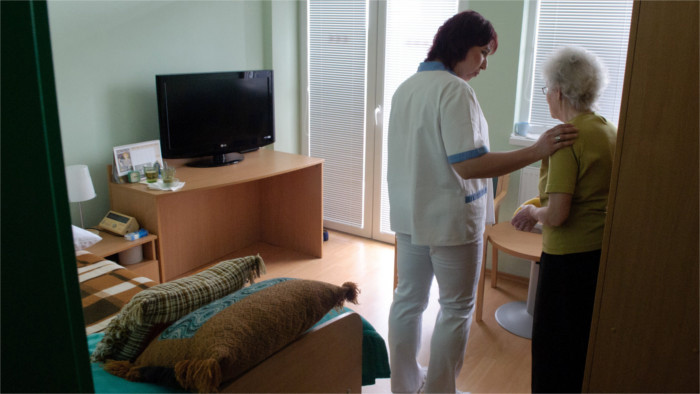“As of July 1, we are increasing the caregiver's allowance to match the net minimum wage, which this year is exactly €615.50,” announced Minister of Labor Erik Tomáš (Hlas-SD) on June 12.
"We were watching it on TV, and then—boom! We discovered that although they granted us €615.50, they deducted the exact amount they raised for pensioners," complains caregiver Mariana Michalská.
The problem stems from the fact that the caregiver’s allowance depends on the income of the person receiving care. If the dependent's income exceeds twice the subsistence minimum (currently around €550), the caregiver's contribution is reduced. Since July, around 660 caregivers have lost their allowance, and over 1,200 are receiving less than the promised minimum wage.
For example, last year, caregiver Mrs. Márií received the full allowance of €530. This year, she expected it to rise to €615. However, because the income of the person she cares for now exceeds the minimum subsistence level, her allowance was reduced to €480.
“We see this as a form of punishment. Everyone needs an income to survive. If the income barely reaches the minimum wage and it’s reduced because the dependent, like a pensioner, has a slightly higher income, it seems completely illogical,” says Iveta Ždiľová, vice president of the Slovak Chamber of Caregivers.
"We are in such a situation that, after paying all the bills this month, we only have €45 left. We wonder how we'll survive. You can't live on this, especially as a single breadwinner. I have to support myself and two children," adds Michalská.
“It’s a life on the edge of poverty, filled with constant fear for the future, and the inability to ensure a decent standard of living for oneself or one’s children,” Ždiľová continues.
Other caregivers face similar challenges, particularly as pensions have been repeatedly increased. Last year, the average old-age pension was €640, which is well above the €550 threshold, or twice the subsistence minimum. Monika, who cares for her disabled mother, receives only €188 a month because her mother's income is considered too high.
“In June, I was informed that my allowance would be reduced from €220 to €188. That’s my only income. You can’t survive on that. After paying my bills, my family has to help me,” explains caregiver Monika Stratená.
Caregivers can seek employment, but if their earnings exceed 2.5 times the subsistence minimum, their allowance is reduced. However, according to the caregivers, full-time care makes it impossible to hold a job.
“I have to change diapers, dress her, cook, and be there constantly because she also has epilepsy. It’s a full-time responsibility,” Stratená continues.
"We recognize how demanding it is for those who take care of their relatives at home," says Zuzana Stavrovská, the Commissioner for Persons with Disabilities.
Low state contributions are forcing some caregivers to consider working abroad. Beáta, who currently receives €470, is also thinking of leaving. "If this continues, we’ll all go. No one can live on €400," she laments.
"I understand that savings need to be made somewhere, but why target the lowest income earners?" asks Michalská. Caregivers' allowances have been decreasing since 2009, but the impact has been felt most this year due to significant pension increases.
“We’ve been raising this issue ever since the Chamber was established. It’s a serious problem, especially for caregivers of working age,” Ždiľová clarifies.
The Ministry of Labor is aware of the issue. Minister Erik Tomáš has promised to limit or eliminate the reductions.
Caregivers now wait for further changes. From December, the government plans to abolish the reduction of care allowances based on the dependent person's income, a measure that will cost the state €21 million.
“For the first time in history, the reduction of all caregiver allowances will be canceled, regardless of the dependent's income or whether the caregiver is of working or retirement age,” says Minister Tomáš.
“We’re very pleased that an agreement was reached in parliament and that funding was found to reverse the cuts for all caregivers,” adds Ždiľová.
The final decision on the ministerial proposal now rests with parliament.
While caregivers are looking forward to the changes, many hope for retroactive compensation for the losses they've faced since July. “It would be fair to compensate us from the time the cuts were implemented,” says Michalská.
Minister Tomáš disagrees: “If we applied that principle, we’d have to consider retroactive payments for everyone whose allowances have been cut since 2009, which wouldn't be entirely fair.”
Caregivers also highlight other missing benefits. "We were told that, because we’re registered through the employment office, we’re not eligible for tax credits or sickness benefits,” Michalská notes. Minister Tomáš is open to discussing additional benefits and measures for dependent people in the future.
The current caregiver allowance will expire in January 2026. Under the new social services reform, dependents will receive a set amount of money, which they can allocate as they see fit. This change will affect over 70,000 caregivers.
“Under the new system, there will be one dependency allowance. The person receiving care can choose whether to give it to a relative for home care, hire a home healthcare worker, or pay for a residential facility,” explains Minister Tomáš.
“It’s crucial for the state to support caregivers. The Convention on the Rights of Persons with Disabilities affirms the right to live independently, but people must be provided with the help they need, especially in a family environment,” concludes Commissioner Stavrovská.
Source: STVR
Jeremy Hill, Photo: TASR

